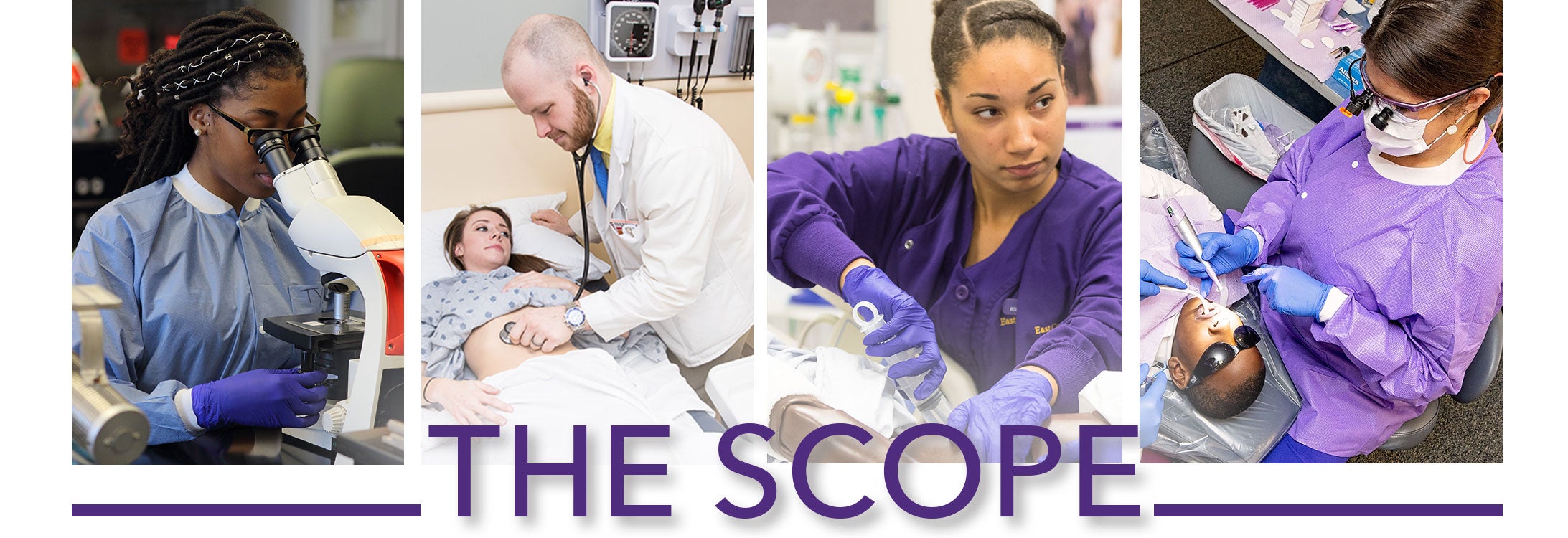October 2022
Welcome to the October issue of “The Scope,” the newsletter of ECU’s Health Sciences.
Dear Colleagues,
During conversations over the last few weeks with friends and colleagues in our mountain communities, I have heard time and again how vibrant and beautiful the fall foliage is in the Blue Ridge Mountains. As the autumn color makes its way east, I am reminded just how far ECU’s Health Sciences Campus and the School of Dental Medicine have come in establishing a presence in communities across our entire state. It is a testament to our collective mission of service and regional transformation.
Students and alumni from the School of Dental Medicine are putting our mission to work in classrooms, clinics and communities. While that has been a hallmark of our model since our first class arrived, we are approaching the charge in a way that assesses not only where we are now but where we are headed in the pursuit of better oral health for North Carolina. Our faculty and staff continue to foster the school’s mission to prepare leaders, provide educational opportunities, provide and enhance oral health services, foster a learning environment and influence future clinical practice.
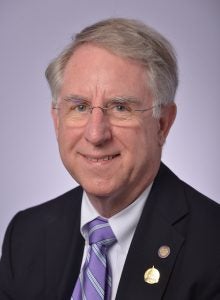
Dr. Greg Chadwick
Dean, School of Dental Medicine
This semester, we welcomed our 12th class of 52 dental students, selected from among more than 325 applicants. This is a talented, diverse and service-minded group that hails from 27 different North Carolina counties, 15 of which are rural. Our Preparing Tomorrow’s Dentists pathway programs, meant to give potential students from under-represented groups and disadvantaged backgrounds a hands-on view of dental school, has attracted nearly 540 participants, 86 of whom enrolled in the ECU School of Dental Medicine.
We now have more than 400 alumni; as our numbers grow, our graduates increasingly represent an accurate cross-section of the patients and communities they serve. Faculty, residents and students in our Ross Hall facilities, hospital clinics and community service learning centers have provided care for more than 92,000 unique patients, about 30% of whom are dental Medicaid patients.
We are also answering the call in the counties that still have few or no practicing dentists. Our Bertie County School Based Oral Prevention Program, funded by the Duke Endowment, kicked off in 2020 and has seen resounding success for young patients who need consistent dental care. More than 700 students have received treatment through the program, which is slated to expand to Jones County next year. Our clinic in Hyde County — which has no practicing dentists — opened last April and has provided care for more than 60 patients so far. Our very successful ECU Smiles for Veterans program, which has expanded to three community service learning centers, has provided care for more than 250 veterans, with one more event to be held in 2022. We are also continuing to expand our educational experiences and care for patients with special needs.
Technology also remains one of our school’s priorities; it is a cornerstone of delivering our curriculum and a vital part of our commitment to providing the very best patient care. Earlier this month, the School of Dental Medicine was named an Apple Distinguished School for 2022–2025 for its use of technology in every aspect of teaching, learning and clinical practice. All of our clinics, classrooms and seminar rooms are video-teleconferenced; this connectivity in conjunction with a common electronic patient record system helps maintain our young teledentistry research network. Educationally, all instruction and assessments are digitally optimized as well; our students are exposed to techniques in digital dentistry.
These capabilities also leverage our thriving faculty research enterprise, which include awards from the National Institutes of Health, Health Resources and Services Administration and the International Congress of Oral Implantologists, among others. Dental medicine faculty take on innovative projects with collaborative partners including the ECU College of Engineering and Technology, the ECU Public Health, Oral Health and Health Disparities Research Administration Hub, the ECU College of Allied Health Sciences and the N.C. Department of Health and Human Services’ Oral Health Taskforce. The discoveries yielded through these projects and partnerships have the potential to open doors to new treatments and new frontiers for dental care.
As our individual schools and colleges continue producing top-quality graduates for North Carolina, the Health Sciences Campus is making a difference in the health care of our citizens, one rural community at a time. I wish each of you the best during this autumn season as we work together toward common goals and a mission to serve our region and all North Carolinians.
Greg Chadwick, DDS, MS
Dean, ECU School of Dental Medicine
Education
Current and potential students benefited from innovations by faculty and staff that gave them more hands-on experience in health care and research.
When Dr. Kelsey Fisher-Wellman began teaching students in his physiology lab at the East Carolina University Brody School of Medicine he knew two things — he needed to be productive with his cancer research program and for his students to be successful in their professional careers they needed to have their names on peer-reviewed articles published in academic journals.

Dr. Kelsey Fisher-Wellman, center, works with students during a lab at the East Carolina Heart Institute. Fisher-Wellman teaches a unique course where instead of final grades, students strive for journal publication. (Photos by Rhett Butler)
“Letters of recommendation are okay. Grades, no one’s really going to look at them. What’s going to matter moving on from graduate school is, ‘What have you done? What have you produced?’” Fisher-Wellman said. “And that usually comes down to publications and grants. Grants are pretty tough to get but (publishing) is something you can do. The scope of publications is getting bigger and bigger but there is, and there will always be, a space for well-done, quality research that fits into a society or field specific scientific journal.”
So instead of an end-of-course grade, Fisher-Wellman’s students receive co-authorship on a peer-reviewed academic journal based on real-world research that produces tangible results.
He considers his students to be trainees because they need training in the laboratory to learn how to use the equipment and scientific processes to arrive at legitimate scientific findings. The best way to do that is to have students actually do science instead of reading about science from a book or performing a “lab practical” with a pre-determined outcome.
In theory, the class seems rather simple. The first few days are reserved for some traditional instructional learning — how to work in the lab, the research objective for the semester — and then his trainees get to work.
“If a new student comes in, they have to get trained on how to use the instrumentation,” Fisher-Wellman said. “Well, the best way to train somebody is by getting them engaged.”
Patient Care
Events on campus bring collaborative experiences and knowledge to the way providers, students and patients work together while managing chronic diseases.
Physical therapy students from the College of Allied Health Sciences have been at the helm of a free, student-run clinic for several years, delivering quality health care to eastern North Carolinians who would otherwise be lack treatments that would help them regain function of their bodies after setbacks caused by illness or injury.
A new partnership with fellow College of Allied Health Sciences students from the Department of Occupational Therapy will further enrich the quality of care provided to patients at the student-run clinic, with an increased focus on rebuilding whole-of-life capabilities like returning to work, adapting to new physical limitations or simply getting dressed.
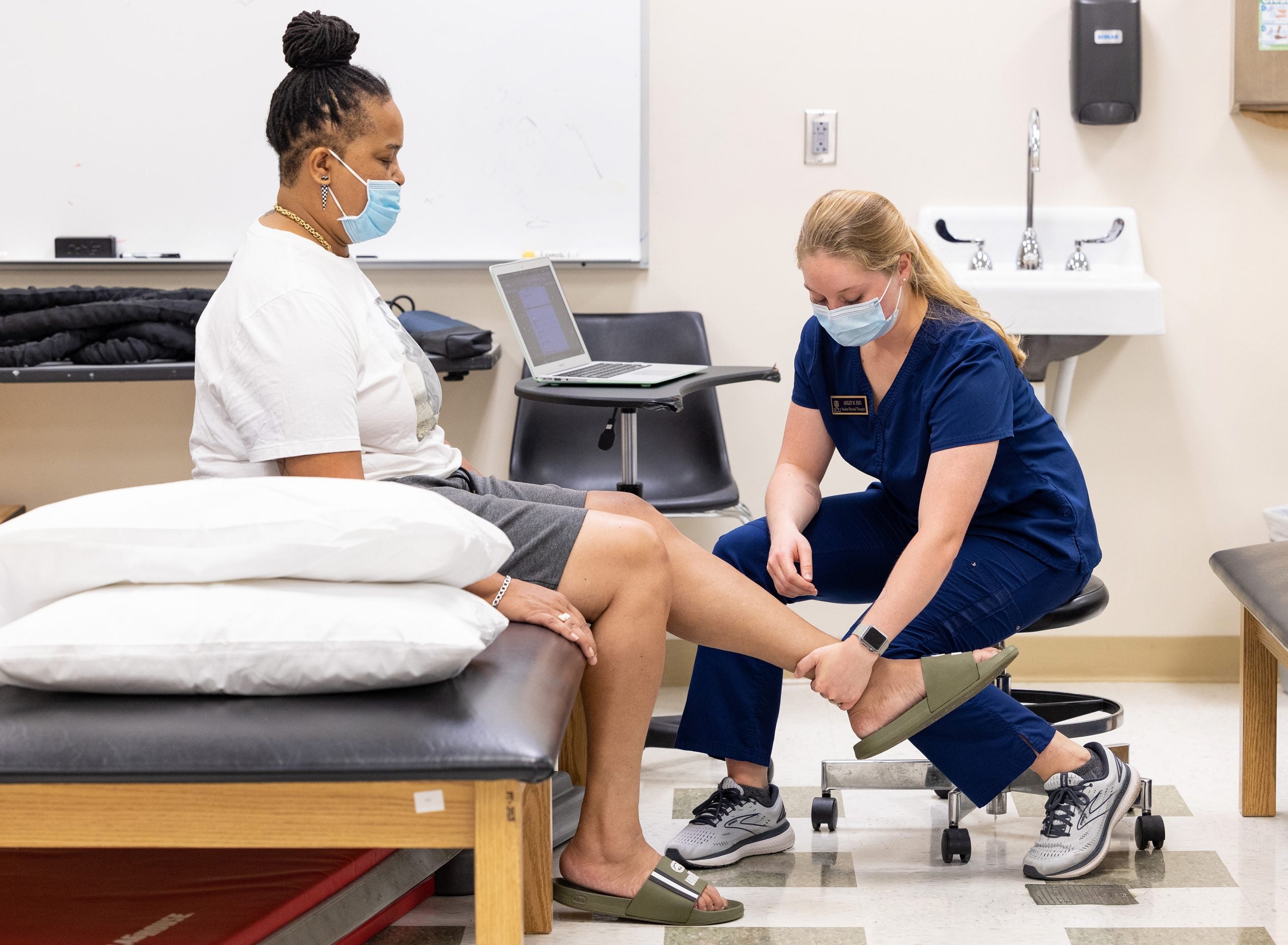
Occupational Therapy sudent Ashley King works with a patient during the clinic. (Photo by Rhett Butler)
The student-run clinic is free for patients, which is a key part of the ethos of the College of Allied Health Sciences — for students to be of service to the community while enrolled at ECU, which helps to instill a sense of commitment to give back once graduates are in the workforce.
“Our mission is to bridge the gap between quality rehab services and people who are under- or uninsured,” said Logan Leggett, an occupational therapy student from Hazlehurst, Georgia. “So, we offer pro bono services through this clinic. We’re able to get clinical experience, that interprofessional education piece, and we’re also able to increase access and work on addressing health disparities in the community in a very tangible way.”
Leggett said that many of the clinic’s patients are referrals from ECU Health who are often discharged after treatment after experiencing a stroke, for instance, but have no access to occupational therapy once they leave. An inability for patients to have for-fee occupational therapy, due to a lack of private insurance or having exhausted their allotted OT visits covered by insurance, often results in referrals from health care providers at the time of discharge.
“The fact that we’re getting referrals from doctors, orthopedic surgeons, they wouldn’t refer their patients to us if they didn’t think their patients would get better with our care,” said Heather Hubeli, a third-year physical therapy doctoral student.
The student-run clinic sees 20-25 patients a week over two days of sessions, which are overseen by faculty from the physical and occupational therapy departments. Patients meet with students for an intake evaluation and then collaborate with students on an individual care plan, as would occur in an outpatient therapy setting, but with the added oversight by faculty members.
The inaugural Tate Holbrook Annual Sickle Cell Disease Update brought patients, providers and experts together Sept. 30 at the East Carolina Heart Institute to share information on history, treatments, impact and advocacy for patients with sickle cell disease.
The event, hosted by East Carolina University’s Comprehensive Sickle Cell Program and the Division of Hematology and Oncology in the Department of Pediatrics at ECU’s Brody School of Medicine, brought nearly 80 participants from across the country to the sessions and panel discussion.
For patients, the conference offered not only a chance to connect with other patients and with providers, but also to be heard.
Majara Mooring, a sickle cell disease patient, encouraged others to come to the conference to learn more about the disease and how to best care for patients.
“Living with sickle cell can be very hard,” Mooring said. “I’ve lived with it basically all my life. I think physicians can learn from patients by asking questions and listening to our concerns.”
Mooring also participated in the patient/provider panel during the conference.
“I hope everyone can actually learn about the disease; it’s very important,” she said. “Know the patient and know yourself as a patient.”
Holbrook said the journey to where the Comprehensive Sickle Cell Center is today is in large part because of patients and their families.
“I’ve been loved by many of our patients and families,” he added. “It’s almost as if they have said to me, ‘Grant us your friendship.’ I want you to remember that. All of us in medicine need to be granted the ability to make friends with our patients. Our families have been empowered to learn about their children with sickle cell disease, to expect the best comprehensive acute and chronic care possible and to experience the power of hope.”
Holbrook said the center enables patients and families to oversee their own care and be part of the decision-making processes related to their child’s health.
“I have learned from these patients and families to listen, learn, share and care,” he said. “We’re all family at ECU.”
Dr. Wayne A.I. Frederick, president of Howard University and the Charles R. Drew Professor of Surgery, gave the keynote address, “How Warriors Can Arm Themselves with Knowledge to Pursue Their Biggest Ambitions.”
Frederick grew up in Trinidad and Tobago and was diagnosed with sickle cell disease at birth. He is now a surgical oncologist at Howard University Hospital and encourages others with the disease to surpass obstacles the condition presents and to advocate for a cure.
Frederick said he had access to a sickle cell center as a young adult that provided resources and coping mechanisms for living with sickle cell anemia. Such centers, he said, are vital to patient and family experiences as they navigate the disease, as well as helping instill confidence to live as fully as possible.
“I think it’s important to be active and be involved in things that you enjoy,” he said. “I have been very fortunate to be blessed with a support system around me that has been absolutely exceptional.”
In terms of how care is provided to sickle cell patients, Frederick said trust must be established with patients through understanding their specific situations.
“We must recognize that we have to meet patients where they are,” he said. “Medicine and care is a partnership; it’s a partnership built on trust between a doctor and patient.”
Research
Health sciences research and trials have a direct impact on patients across eastern North Carolina.
A student in the Brody School of Medicine and a pediatric resident at ECU Health have published their research on physical activity in adolescents attending rural schools.
Their findings suggest that more physical education is needed in rural eastern North Carolina middle schools to meet the health needs of adolescents — and to address health disparities evident across those age groups.
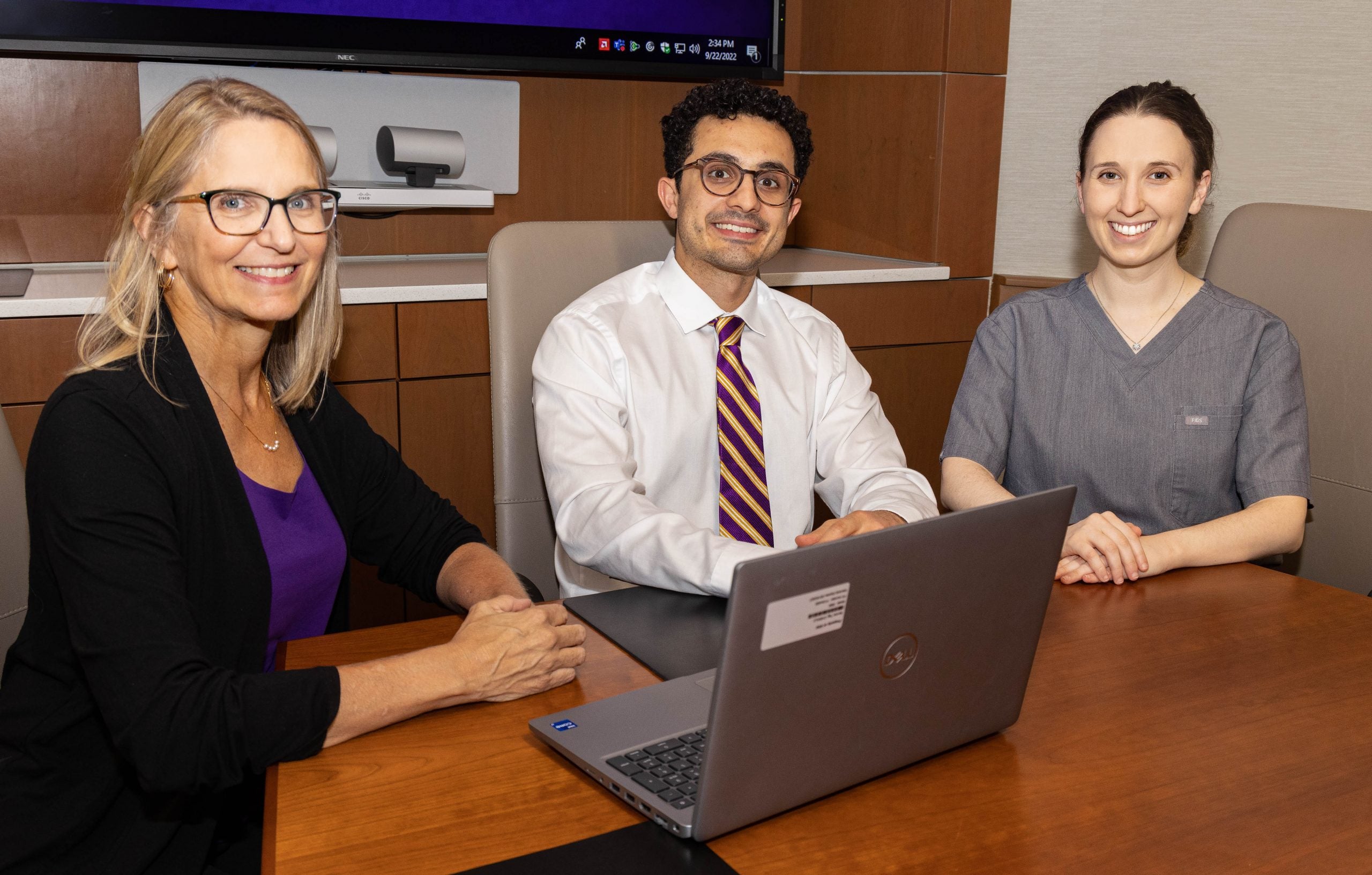
Dr. Lazorick with authors of a research paper. (ECU Photo by Cliff Hollils)
Brody student Sina Kazemzadeh and co-author Dr. Chloe Opper published the paper, “Determining Trends and Factors Associated with Self-Reported Physical Activity among Adolescents” in the International Journal of Environmental Research and Public Health. It appears in the journal’s special issue, “Physical Activity, Body Composition, Health Behaviors and Related Health Issues.”
The publication is the culmination of work Kazemzadeh and Opper began in the summer of 2020; the study yielded three major findings.
“Most adolescents in our study reported that they did not get the recommended amount of physical activity set by the CDC, which is 60 minutes of physical activity a day,” Kazemzadeh said. “This is consistent with adolescents in the United States.”
Schools that offered consistent physical education yielded more active students.
“Participants who attended schools with more physical education reported getting more physical activity,” he said. “We brought this disparity to light and called for policy changes to increase the amount of physical education in eastern North Carolina middle schools.”
Dr. Nasreen Vohra, an associate professor in Brody’s Department of Surgery and a surgical oncologist with ECU Health, is teaming up with Dr. Kelsey Fisher-Wellman, an assistant professor in Brody’s Department of Physiology, on a $200,000 Department of Defense melanoma discovery project that could lead to a better understanding of how the “powerhouse” of immune cells, called mitochondria, differ in melanoma patients; because how a cell utilizes energy is fundamentally linked to how well it works, this information could eventually open doors to new treatments.
This project involves using biopsies of melanoma tumors and immune cells from blood and lymph nodes of patients treated at ECU Health. Vohra and Fisher-Wellman want to better understand how immune cell dysfunction specifically related to how it uses energy keeps immune therapies from working against melanoma, the deadliest type of skin cancer.
In addition to surgery, melanoma treatment often includes immune therapy — a type of cancer treatment that helps the immune system fight cancer.
“Although immune therapy has improved patient outcomes, a significant proportion do not respond,” Vohra said. “While we have made great strides with melanoma and immunotherapy, about 50% of patients will not respond to immunotherapy, especially in this region, where we have patients who have acral lentiginous melanomas (skin cancer that appears on the palms of the hands, the soles of the feet or under the nails; also more common in darker skin individuals) are not as responsive to immunotherapy.”
The study will take a closer look at the mitochondria of T-cells — an important type of white blood cell that plays a central role in immune response — and how dysfunctions in some cells could inhibit treatment success.
The Department of Defense grant will underscore that each of those numbers is a patient with a story — and that each patient’s melanoma could react differently to treatment.
Audrey Taylor travels from Ivanhoe to see Vohra since a stage 3 melanoma diagnosis nearly two years ago. His case is complex because the cancer spread to his liver soon after his initial diagnosis despite being on immunotherapy. He enrolled in a clinical trial initially and has also elected to participate in this study to help his doctor learn more about his disease and how best to treat stubborn cases.
Vohra calls Taylor a “model patient who has continued to contribute to overall knowledge not only on melanoma” but also broadly to the field of immunotherapy.
“I just know we aren’t done yet,” Taylor said. “I’ll be honest with you: This has been an amazing journey for me. I’d never been to the hospital; I’d never been sick. That just goes to show that you don’t know what’s down this road. Whatever I have to do, I’m willing to do it 100%. If it helps one person, it’s been advanced.”
Watch closed-captioning version here
Health Sciences Spotlight
In the spirit of excellence in education and a collaborative campus, we will be highlighting a variety of students, staff and faculty who represent the health sciences colleges and schools.
This month, we meet Dr. Paul Toriello, professor and chair of the Department of Addictions and Rehabilitation Studies.
Dr. Paul Toriello believes almost dying saved his life.
Long before he arrived at East Carolina University’s Department of Addictions and Rehabilitation Studies, Toriello jumped out of a second-story window, breaking bones in his neck.
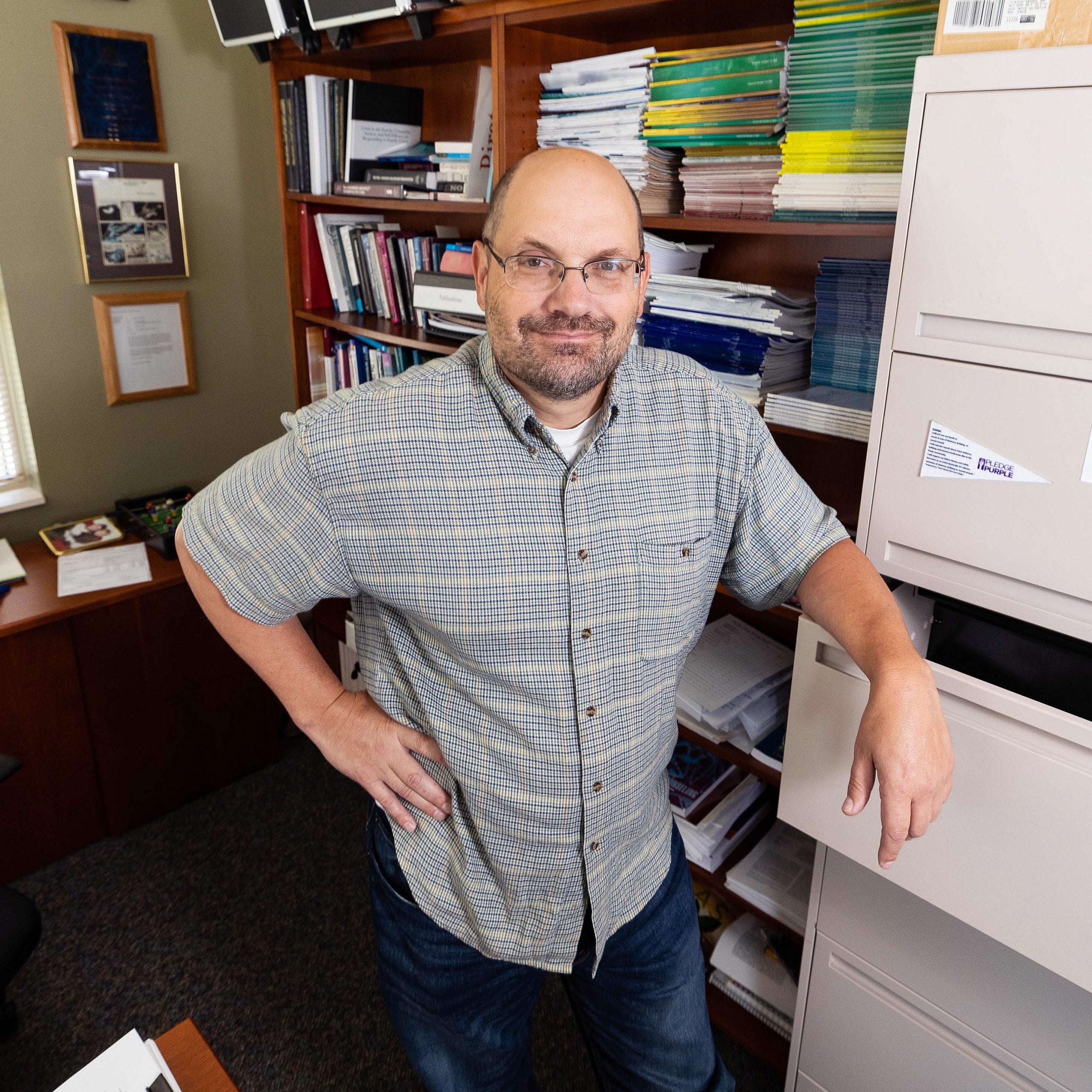
Dr. Paul Toriello, professor and chair of the Department of Addictions and Rehabilitation Studies, has been at ECU since 2005. Photo by Rhett Butler.
“It changed my life,” he said.
He knew he needed helped for his substance use problem.
“I went to treatment and it stuck, and I decided not to use drugs anymore,” he said. “That changed my thinking, changed my behaviors and changed my values. Eventually in college, I decided I wanted to help people the way I had been helped.”
That was in 1989, and now Toriello is chair of the department that trains mental health and addiction counselors in ECU’s College of Allied Health Sciences.
“It’s probably cliché but it’s true: I’m standing on the shoulders of giants. The faculty who mentored me, I owe them a lot,” Toriello said.
While working on his master’s degree, Toriello said he became interested in research, and that continued through his doctoral program at Southern Illinois University at Carbondale.
“I just emersed myself in different ways of thinking about counseling and how people change,” he said. “I wrote papers about controversial topics, and it just led me to falling in love with academics and research and the innovation of counseling.”
After working for two years in the field, he took a job at Louisiana State University in New Orleans. After a few years, he learned ECU was starting a doctoral program in counselor preparation and research, something LSU didn’t have. He left New Orleans — just two months before Hurricane Katrina in 2005 — and arrived at ECU.
“The doctoral program attracted me here, by and large, and the rural environment,” he said. “It’s a different environment than the big city of New Orleans. I dreamt of serving a community and doing research in a community and having an impact.”
Philanthropy
Join us this weekend for a brand-new event as part of ECU’s highly successful Pirates vs. Cancer program.

Pirates vs. Cancer’s inaugural Scare Cancer Away 5K that will be held at 9 a.m. on Saturday, Oct. 29, on the Health Sciences Campus.
Pirates vs. Cancer’s inaugural Scare Cancer Away 5K that will be held at 9 a.m. on Saturday, Oct. 29, on the Health Sciences Campus. Registration ends on Friday, Oct. 28, at 11:59 p.m.
This event will not replace Pirates vs. Cancer’s main hair shaving event in the spring, but instead will help bring awareness year-round by kicking off fundraising efforts in the fall. One hundred percent of all funds raised will benefit programs and services designated for the needs of eastern North Carolina pediatric cancer patients at the James and Connie Maynard Children’s Hospital in Greenville.
These donations will fund critical in-patient needs, such as upgrading medical equipment to provide these children with more effective and manageable treatments. Additionally, donations raised will provide Child Life Services with funding for comfort items crucial during mentally and physically difficult times.
Students, faculty, hospital staff, community members and supporters are welcome to run or walk the 3.1 miles on a certified course with professional timing. Halloween costumes are welcomed and encouraged; there will also be a “best costume” contest.
Pirates Vs. Cancer is a one-of-a-kind tradition that unites ECU students and staff behind a common goal: empowering children to beat cancer and improving the lives of kids battling deadly cancers right here in eastern North Carolina. Each year, participants from all over ECU join together to shave their heads, cut their hair and create awareness by standing in solidarity with these brave children from our local community.
Since the inaugural fundraiser in 2017, the event has raised over $100,000, thanks to the selfless actions of more than 125 shavees and hair donors. The event has also won the prestigious honor of “Outstanding Event of the Year” at ECU twice in a row.
For more information on this weekend’s 5K, please visit https://runsignup.com/race/?raceId=134075.
